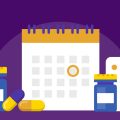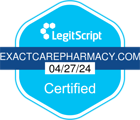
Could Your Medication Be Impacting Your Vision?
Changes to your eyesight can happen for a number of reasons. Age, sunlight and UV rays, alcohol, screen time, contact lenses and smoking can all impact your vision.
Even your medications including prescriptions, supplements and over the counters (OTCs) can affect your vision. Your doctor or pharmacist can review your medications to help protect your eyesight. If needed, they may adjust your dose if they believe one of them could be the cause of eye symptoms. Early treatment can help to protect your vision.
You should never stop taking your medication unless you receive specific guidance from your prescriber. Medication adherence is key to aiding in effective treatment and maintaining overall health. If you stop taking your medication, you could experience unpleasant symptoms in addition to vision changes.
Impact Medication Can Have on Vision:
When starting a new medication, you should always check for any potential side effects that can impact your vision. Sometimes you can experience symptoms such as blurred vision, eye pain, redness or double vision.
For example, corticosteroids can be taken for allergies, asthma, arthritis and other skin conditions and are often prescribed in the form of a cream or pill. They can potentially cause increased pressure inside the eye. This could lead to clouding of the eye and the need for surgery.
Similarly, antihistamines that are commonly used to fight allergies, can raise the risk for blurred vision.
These are just some examples. Always read medication labels before starting something new.
Some medications can cause sensitivity to light. Do you reach for your sunglasses the moment you step outside? If you take antibiotics or diuretics to treat high blood pressure you may be prone to light sensitivity. Avoid being out in the sun during peak hours between ten a.m. and four p.m. to protect your eyes.
What To Look Out For:
When taking a new OTC or a newly prescribed medication, take note of any eye pain, distorted or blurred vision.
If you notice any changes to your vision, reach out to your doctor or pharmacist. They can assess whether the medication is the cause and determine if the benefits outweigh the risks. In some cases, they may prescribe a different medication. Do not stop taking the medication without their guidance.
Importance of Routine Eye Exams:
Your vision is an important part of your health. You should have yearly eye exams to check for common problems or potential diseases. If you haven’t scheduled one in a while, contact your eye doctor.
Your doctor can check for conditions like:
- Cataracts – Clouding of the eye that can lead to blurred or hazy vision and even vision loss.
- Diabetic Retinopathy – Causes damage to the blood vessels in the back of the eye that can cause vision loss and blindness caused by uncontrolled diabetes.
- Glaucoma – Damage to the optic nerve that can cause vision loss and blindness.
- Age-related Macular Degeneration – Gradually can make vision blurry or hazy.
Seasonal allergies can cause redness, blurred vision, itchy eyes, puffiness, watering or dry eyes. But your doctor should still review these symptoms even if they seem minor in case they are being caused by something else. If you notice any drainage, double vision, or experience soreness you should contact your doctor.
Be careful when using new eye drops to help with your symptoms. Sometimes they can make the condition worse or irritate the eyes further. Always speak with your doctor or pharmacist before using a new eye drop.
Other Ways to Protect Your Vision:
- Know your family’s eye health history.
- Eat a healthy diet with leafy green vegetables and work to maintain a healthy Wear protective eyewear when doing activities such as yard work, painting and home repairs.
- Wear sunglasses to protect against harmful UV rays. Wearing hats with a broad brim can also help block out the sun.
- Wash your hands before taking out or putting in contact lenses to avoid infection.
- Limit alcohol consumption or avoid drinking altogether. Excessive drinking can cause some eye conditions to develop even sooner.
- Cut back on screen time. Many people spend several hours a day using computers, cell phones, tablets and watching television. Staring at screens can lead to eye strain and dry eyes. This can lead to blurry vision.
If you’re looking for more tips, check out this resource from the Centers for Disease Control and Prevention (CDC).
If you have questions about medications and the impacts they can have on your eye health, call us at 1-877-287-1609. Our pharmacists are here to help!







